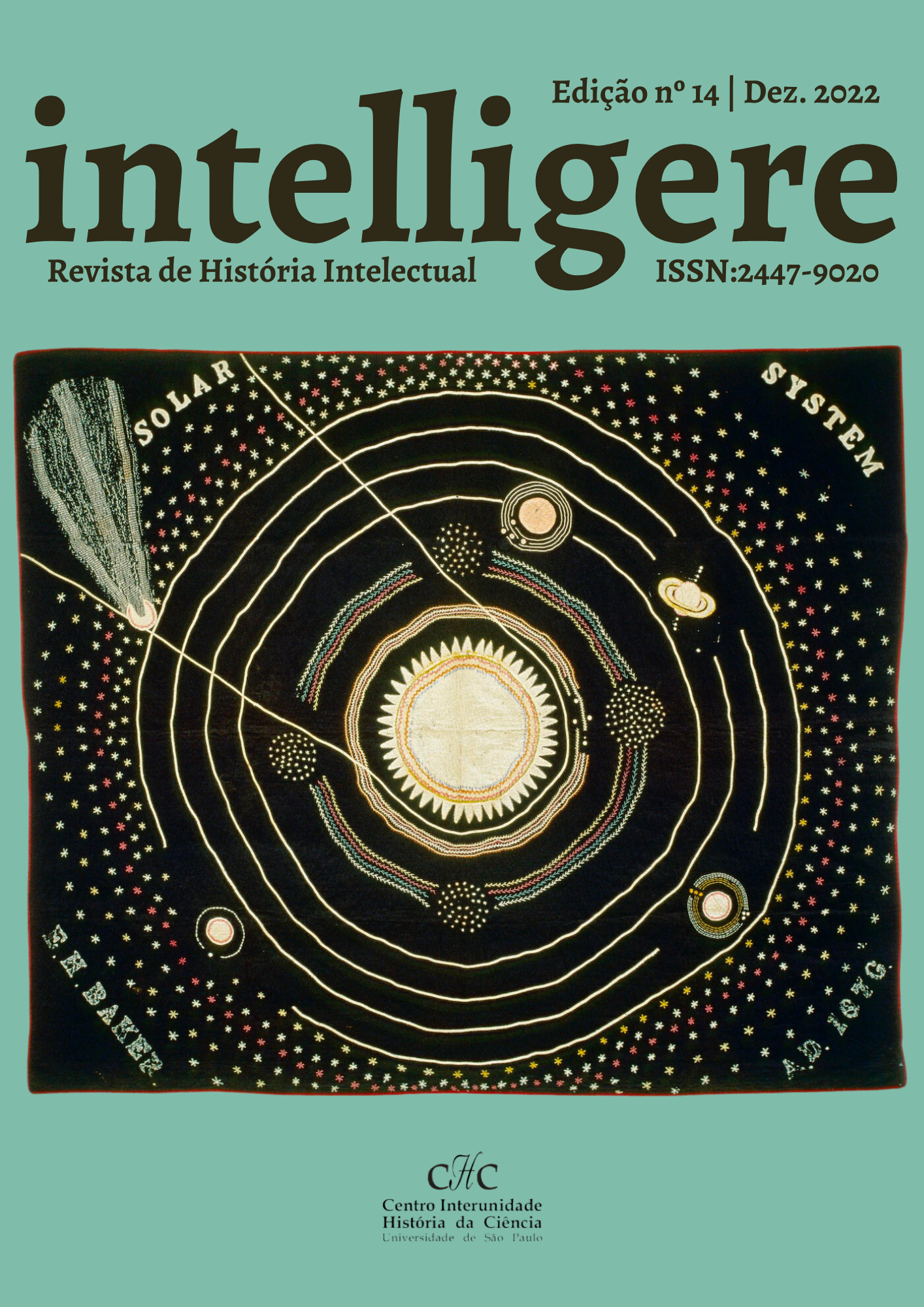Descartes, cartesianism and the tradition about the plurality of worlds
DOI:
https://doi.org/10.11606/issn.2447-9020.intelligere.2022.208409Keywords:
Plurality of worlds, Habitability of worlds, René Descartes, Cartesianism, CosmologyAbstract
The themes of plurality and habitability of worlds participate in a millennia-old tradition and discussion, in which topics and experiences of the most diverse natures converge. Originating from ancient Greece, these ideas move through time and come to assume distinct characteristics and uses. In the second half of the seventeenth century, with the cosmology formulated by René Descartes, especially with his theory of vortices, this tradition acquires a new dimension, as these ideas are shared and disseminated by Cartesians, so that an infinite universe sparks imagination and conceptual speculation for other solar systems conceived by artists, writers, and philosophers. Therefore, I propose an exercise in historical hermeneutics, which aims to gather information and traces about this tradition between Descartes thought and subsequent Cartesianism. It is an attempt to reconstruct, at least in part, the transmissions and receptions of the theme as a trajectory of an idea over time.
Downloads
References
ALADICS, S. Aristotle and the Atomists on the Nature of “space”. Royal Holloway: University of London, 2016.
BOREL, P. Discours nouveau prouvant la pluralité des mondes. 1657
BURT, E. A. The Metaphysical Foundations of Modern Physical Science. New York: Dover Publication, 2003.
BUTTERFIELD, H. The Origins of Modern Science: 1300-1800. New York: The Free Press, 1965.
CARRÉ, M.-R. “A Man between Two Worlds: Pierre Borel and His Discours nouveau prouvant la pluralité des mondes of 1657”. In: Isis, Volume 65, Nº 3, 1974
CHABBERT, P. “Pierre Borel (1620?-1671)”. In: Revue d'histoire des sciences. Volume 21, Nº 4, 1968.
COHEN, I. B. The Birth of a New Physics. Penguin Books, 1992.
CORNFORD, F. M. “Innumerable Worlds in Presocratic Philosophy”. In: The Classical Quarterly, Vol. 28, No. 1, 1934.
COSTA, L. de A. Antigos e Modernos: A Cena Literária na França do Século XVII. São Paulo: Edusp, 2009.
DESCARTES, R. Princípios da Filosofia. Lisboa: Edições 70, 1997.
DICK, S. J. Plurality of Worlds. Cambridge: Cambridge University Press, 1984.
DREYER, J. L. E. A History of Astronomy from Thales to Kepler. New York: Dover Publications, 1953.
FONTENELLE, B. L. B. de. Diálogos sobre a pluralidade dos mundos. Campinas: Editora da Unicamp, 2013.
GUERICKE, O. V. Experimenta Nova (ut vocantur) Magdeburgica de Vacuo Spatio. 1962.
HASKINS, C. H. The Renaissance of the Twelfth Century. Cambridge: Harvard University Press, 1971.
KIRCHER, A. Iter extaticum coeleste: quo mundi opifi cium, id est coelestis expansi siderumque tam errantium.1660.
LAMPRECHT, S. P. “The Role of Descartes in Seventeenth Century England”. In. Studies in the history of ideas. Volume 3, New York: Columbia University Press, 1935.
LOVEJOY, A. O. The Great Chain of Being: a Study of the History of an Idea. Cambridge, Massachusetts and London: Harvard University Press, 2001.
MARSAK, L. M. Bernard de Fontenelle: The Idea of Science in the French Enlightenment. Transactions of the American Philosophical Society New Series, Vol. 49, Nº 7, 1959a.
MARSAK, L. M. “Cartesianism in Fontenelle and French Science, 1686-1752”. In: Isis, Volume 50, Nº 1, 1959b.
MUGLER, C. Deux thèmes de la cosmologie grecque: devenir cyclique et pluralitè des mondes. Paris: Klincksieck, 1953.
MOUY, P. Le Développement de la Physique Cartésienn. Paris: Vrin, 1934.
NICOLSON, M. H. “The Early Stage of Cartesianism in England”. In: Studies in Philology, Volume 26, Nº. 3, 1929.
NICOLSON, M. H. Voyages to the Moon. New York: The Macmillan Company, 1948.
ROSSI, P. A Ciência e a Filosofia dos Modernos. São Paulo: Editora da Unesp, 1992.
ROSSI, P. O Nascimento da Ciência Moderna na Europa. Bauru: EDUSC, 2001.
ROSSI, P. “Nobility of Man and Plurality of Worlds”. In: DEBUS, A. G. Science, Medicine and Society in the Renaissance. Volume 2, Heinemann Educational Books, 1972.
SPINK, J. S. French Free-Thought from Gassendi to Voltaire. Bloomsbury Academic, 2014.
VRIES, G. de. Dissertatio academica de lunicolis. In: VOET, D. Physiologia, sive de natura rerum libi sex. Trajectum ad Rhenum, 1688.
WEBSTER, C. “Henry More and Descartes: Some New Sources”. In: British Journal for the History of Science, Volume 4, Nº 4, 1969.
Downloads
Published
Issue
Section
License
Copyright (c) 2022 Gustavo Santos Giacomini

This work is licensed under a Creative Commons Attribution 4.0 International License.
Autores que publicam em Intelligere concordam com os seguintes termos:
- Autores mantém os direitos autorais e concedem à revista o direito de primeira publicação, com o trabalho simultaneamente licenciado sob a Licença Creative Commons Attribution que permite o compartilhamento do trabalho com reconhecimento da autoria e publicação inicial nesta revista.
- Autores têm autorização para assumir contratos adicionais separadamente, para distribuição não-exclusiva da versão do trabalho publicada nesta revista (ex.: publicar em repositório institucional ou como capítulo de livro), com reconhecimento de autoria e publicação inicial nesta revista.
- Autores têm permissão e são estimulados a publicar e distribuir seu trabalho online (ex.: em repositórios institucionais ou na sua página pessoal), com reconhecimento da autoria e publicação inicial nesta revista.




